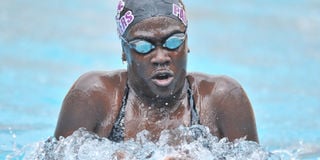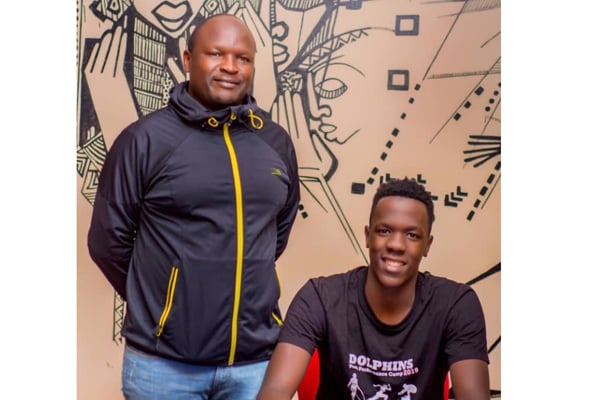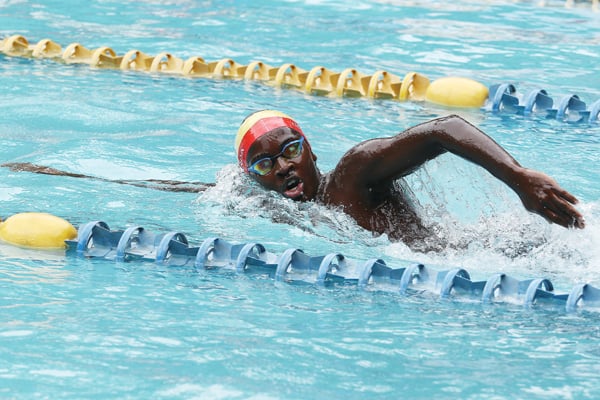Prime
Jamila Lunkuse wants athletes’ mental health to be centerpiece

What you need to know:
- Star. Last month, two-time Ugandan Olympic swimmer Jamila Lunkuse was elected to the Fina athletes committee which features representatives from all six aquatic disciplines and the six regions under the global swimming body.
Star. Last month, two-time Ugandan Olympic swimmer Jamila Lunkuse was elected to the Fina athletes committee which features representatives from all six aquatic disciplines and thesix regions under the global swimming body. In doing so, Lunkuse, 25, a daughter to Yusuf Nsibambi, a lawyer and Mawokota South Member of Parliament (MP), became the first Uganda to serve on the 20-man committee that will represent swimmers across the world. The former Seals Swim club member also serves on the Uganda Swimming Federation (USF) executive committee and has coached younger swimmers. Upon her return from Budapest, Hungary where the election was held on the sidelines of the Fina World Swimming Championships, she spoke to Sunday Monitor’s Ismail Dhakaba Kigongo in a two-part series about the past and next phase, six years after she stopped swimming competitively.
You haven’t been competing actively since 2016. What have you been doing in that time?
When I finished swimming, I still had two years of university. So when I finished swimming, I decided to focus more on school and finding myself outside the pool.
For a long time, I was ‘the swimmer’. So when I stopped, I, in a sense, rediscovered myself. When I finished university, I moved back home to Kampala. I took a couple of months off, just chilling. Then, I started personal training which I did for a year or so then got into CrossFit. I worked with CrossFit KLA in Bugolobi. I left in December last year.
Why did you retire early?
There were different things. When I moved to university, the coaches were different. My body wasn’t adapting to the new coaching style. The environment had changed a lot. At that time, there was a lot of pressure and I don’t do well with pressure. It was close to the Olympic qualifying period. I was adjusting to the new university life. Before that, the bus would take us to the pool and now I had to take myself. Those small things added up.
In training, I was tired. The times I was doing in training were faster than the ones I was doing in races.
Do you think you had peaked early? At 15, you are swimming at the Olympics and the plan should be that in 10 years, you will be a better swimmer but now you aren’t there at all.
A lot of it comes from mental wellbeing. Physically, you can be 100% but mentally, if you are not there, it cannot work. Mentally, I was tired of the sport. With swimming, you have to do that and not experience life or do other things. I had spent my entire teenage life doing that. I was mentally tired. I wasn’t performing in races and that put me off even more.
What were you standing at university in England? How come you didn’t choose your career immediately?
I did Business with Marketing. I tried doing it while I was back home here because I am into the strategy side of marketing. I guess I didn’t find a place that I was a good fit for. Most of the places I went to, they couldn’t hire me because I had not spent a long time here.
Where does the urge to become an administrator in swimming then arise?
I have always been swimming but I don’t shout on the roof when doing my projects. When I came back, I worked with Seals (swim club) as an assistant coach for the younger kids for a few months. I was more interested in the strength and conditioning side of swimming. Before the Covid-19 pandemic, I wanted to get involved in that, the things outside the pool. Then Covid-19 hit and everything was put on a standstill. I spent so many years doing it (swimming).
How much commitment is that that you need?
You need to work more prior to competition. In high school and university, there were two-and-a-half hour training sessions in the morning and evening. Two days a week I didn’t have to work. When you don’t have an evening session, then you have gym. Some days, you do both sessions and gym in between. We had the gym downstairs at school. It takes a lot of commitment and discipline. At the end of the day, it’s you and the pool because the coach cannot tell you what to do as it only affects you.
When you started swimming, there weren’t many Ugandans competing internationally. The numbers have gone up with Adnan Kabuye, Kirabo Namutebi, Tendo Mukalazi, Husnah Kukundakwe et al. Where have all these numbers come from?
The federation plays a huge part, organizing all these meets as well as parents and schools. Before, swimming wasn’t popular in schools but now many children in school do swim and later, they can compete. It’s important to start and then grow.
Now, it’s also good that we are doing different things like the open water race that Ugandans did at the World Championships this year though I didn’t watch the race. If you see a swimmer for whom the 100m butterfly is the main race, they will try to do another race to have fun.
Without international Olympic standard pools, how big an adjustment do Ugandans swimmers have to make after practicing in 50m facilities and some circular ones at hotels?
I feel like it’s a big adjustment going from 25 metres to 50 but I think it’s not something that crosses their mind. Even in a 25-metre pool, you can still get in a good amount of training. Even at international level, you still hear of many who have trained in a 25-metre pool and make the Olympics and win medals. It’s always good to train in a 50-metre to acclimatize so if you know how to race without that many turns, you can adjust well.
When you look back at your time as a swimmer starting out, how was it and the growth to get where you got?
I was very fortunate that many of my friends so it started as a social event. Going for competitions was part of socializing. Even when I moved to England, it was all about swimming. When under pressure, I don’t perform. I was never like; “I need to be better than this person.” I was focusing on myself and that was a good thing. My coaches in England always pushed me to focus on my own individual goals because everyone swims differently. I have a good support system. While training here, I could skip a few laps here and there then when I moved, the coach said “you really need to get serious with your swimming.” When I did that, I started to improve massively.
At what age did you move to England?
I was in year nine (class for 12-year olds). I was in boarding school because there were other people my age and people from different parts of the world. I stayed in a house of swimmers – girls on the top floor and boys at the bottom. Everyone could relate and we did the same training.
I have heard from swimmers that they don’t get the attention they deserve when they train in England since coaches are dealing with many swimmers. Is that the case?
I didn’t experience that. I was very fortunate. My coaches focus on every person individually - everyone’s strong point and everyone’s weak point. Before competitions, you would chat with coaches and they told you what you didn’t learn. Even if there were other people around, you would never claim that you aren’t seen. My experience was very good.
Now, the new role. How did you wake up and decide to get involved in the politics of Fina? Is that a trait picked from your dad?

Lunkuse does not regret retiring early, having made her swimming debut at the 2012 Summer Olympics in London. PHOTOS / ISMAIL KEZAALA
I don’t like politics. I am not a political person. It was basically Mr. (Moses) Mwase, the president of USF, who actually sent me the form and told me that it would be cool if I applied. I applied just a few hours before it closed. At the back of my mind, I thought I wouldn’t get it but there was nothing to lose. If I get it, it would be amazing but if I don’t… I knew every federation in Africa was going to apply.
What are you supposed to do in this new role?
I am just learning, honestly. Essentially, we are the bridge between Fina and the athletes. Basically, raising the concerns of athletes in regard to Fina and Fina events.
How do you link up with the swimmers and their coaches?
It depends on each representative as they have different needs. If you go to different CANA regional competitions, you get to interact with coaches and athletes more. Otherwise, Zoom is an option.
When do you start doing this role?
We had a sit-down chat and just had a conversation on how the role works. We have a chair and vice-chair.
Which challenges do African swimmers have to overcome?
Definitely, facilities is one. I know in Uganda, we have started to have pools. There are more 25-metre pools. We need to look at the mental wellbeing side of sports. It’s not given much time as it should be. Many do not have access to a sports psychologist. When you are swimming at that high level, you need someone you can talk to. Then, there is nutrition. I feel like when you are younger, it’s easy to get PBs (Personal Best times). Every single competition you get a PB. Then, you reach a point where you must fine-tune those small things like nutrition, sleep, mental wellbeing, strength and conditioning. The tiny micro-second or second makes a big difference. It could be just improving on your start or turn.
As a leader now, you must provide solutions. What are those solutions?
The best bet is that I am going to learn. Every athlete is different. Everything federation works differently. One approach may not work for all. I am going in with an open mind and willing to learn and listen to understand how athletes are feeling. Then, I will also partner with those in the specific fields. For example; I am not a sports psychologist but if I find one, then build on projects from there.
Swimming competitions often have families of swimmers in the stands. How important is family support?
Family support is important. They are with you in the good and the bad days. They see you waking up super early and see you come back tired and then you rest and go again. Most times, it’s someone from your family taking you to training. They see the whole process then they come to watch competitions because it’s what you have been working towards.
You don’t feel comfortable anymore swimming in bikinis because of religion. Is that true?
Yeah, modesty is a big thing in Islam. I have reached a point where I am exploring different things. Just because I was a swimmer doesn’t mean it is something I can do forever and I cannot do other things. I am learning more about religion and why certain things are the way they are and set to be. It’s made me have a different approach because I am not going to be here forever.
How involved is your dad in your swimming?
When I was swimming, he was very involved. For many competitions in Nairobi and Mombasa, he was there if he wasn’t working.
How much government support did you get?
I don’t know. When I was younger, I didn’t know what was happening but I don’t think they supported me much. When I started university, I got an Olympic scholarship and that helped a little. It waives some fees for Olympic-affiliated events.
Your final word
We should be appreciating everyone’s efforts. When I was swimming, there was Joshua and Elisha Ekirikubinza. They were all great swimmers. That’s the problem with sport here and sports in general, they just leave people out. If someone is excelling, you always focus on that one person but credit should be given to other swimmers as well because it is a hard sport. I always tell people to have a life outside swimming. Make it as enjoyable as you can because it keeps you in the sport for longer and takes off pressure.
Part two will run next week as Nsibambi details his experience of allowing his 11-year old daughter to move to England without family to study and pursue a career in swimming.
LUNKUSE’S BIGGEST EXPERIENCES
2012 Olympics (London, England)
It was very surreal. In swimming, I had seen these athletes but not the other sports. So you look at them and say ‘wow, they are a real person’. They don’t feel real then they eat on the same dining table. It was really cool.
2009 World Swimming Championships (Rome, Italy)
That was my best world championship ever because I just didn’t really care. I was 13. That happens when you are younger as you don’t really mind. Someone told me to go to the middle lane where the fast swimmers go and I went despite being advised to the side lanes. They would be overlapping me but I didn’t care. It was my first big competition outside of CANA.
2008 CANA (Harare, Zimbabwe)
I swam the 200m breaststroke and it was the longest race ever. I remember swimming and could see all these people going past and I wasn’t moving. My technique wasn’t great. It was the first time I raced in a 50-metre pool.
Jamila Lunkuse factfile
Born: 1997
Olympic debut: Swarm in the women’s 50m freestyle at the 2012 Summer Olympics in London, finishing with a time of 28.44 seconds in 52nd place in the heats.
Education: Studied at Plymouth College from 2013. Attended the University of Brighton to study Business and Marketing.
Achievements: In 2013, she won eight medals at the CANA Zone 3 and 4 Championships that were held in Lusaka, Zambia. That haul included 7 golds in the 50m breaststroke (competition record), 100m breaststroke, 200m breaststroke, 100m freestyle, 200m freestyle, 50m butterfly and 200m. Her silver medal was in the 50m freestyle.




